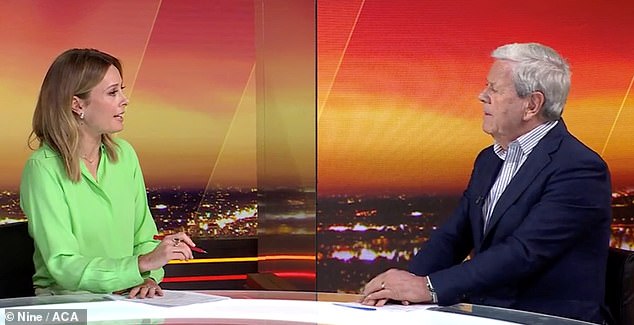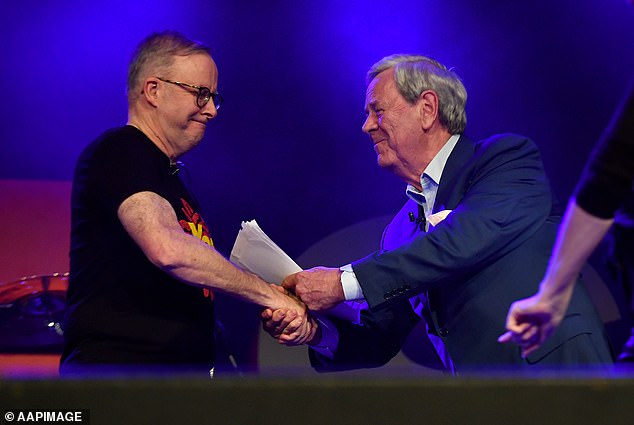Fierce moment Ally Langdon calls out Ray Martin over his ‘dinosaurs and d*ckheads’ claim about No voters
Ray Martin has stuck to the controversial language he used at a Yes rally, where he described No voters as ‘dinosaurs and d***heads’, adding he would repeat it if given the chance.
The veteran journalist told Yes voters that the world would be watching Australia when the referendum takes place on October 14.
“If you don’t know, find out what you don’t know,” he said at a Yes event in Marrickville, Sydney, late last month.
“What that slogan means is if you’re a dinosaur or an asshole who can’t be bothered to read, then you should vote no,” Martin stated.
A week later, Martin appeared on the Channel Nine news program he once presented and was challenged by Ally Langdon about the language he used during a heated 17-minute interview.
When asked if he regretted his choice of words, Martin said no and initially denied any swearing.
“I would never call the No voters dinosaurs or anything else,” he said, before Langdon intervened and said he had called them “dinosaurs and assholes.”
‘No, I didn’t. What I said was what I found offensive, which was the stupid slogan ‘if you don’t know, vote no,’ Martin replied.
‘That’s just confirmation of ignorance. If you don’t know, find out what you don’t know.’

Martin appeared on the Channel Nine news program he once presented on Thursday evening, A Current Affair, and was questioned by presenter Ally Langdon about his language during a Yes meeting.
Langdon said there were many Australians who had a lot on their plates and were struggling with issues such as the cost of living, only to be criticized by Martin for not understanding what the Voice would mean.
She said the respected journalist’s language was “inflammatory.”
“I’ll stick to the language,” Martin said immediately.
‘I’d say it again. It was at Marrickville Hall, I wasn’t speaking against the Catholic Church. I hear it on the radio all the time. What is disrespectful is voting and admitting your ignorance.”
Martin went on to explain that his language was “part of the Australian vernacular,” something most people hear on morning radio and at informal barbecues.
He added that ‘voting Yes’ was simply ‘the decent thing to do’, and said both sides of the campaign had turned it into politics.


TV icon Ray Martin launches an extraordinary attack on No voters, labeling them ‘dinosaurs and d***heads’ last week in a scathing speech to a cheering Yes crowd in front of Prime Minister Anthony Albanese
The pair continued to debate the subject, with Langdon insisting Martin had known his fiery language would be widespread.
‘You know that the most controversial thing you say will be picked up. You were sure it would be provocative, right?’ she asked.
Martin said he didn’t mind what his speech had caused, saying again that those who don’t bother to educate themselves about the Vote and plan to vote No are “dinosaurs.”
“People may be struggling with the cost of living and feel like Ray Martin has just called them a dinosaur and a billboard… do you think any form of name-calling will help?” Langdon asked.
Martin repeatedly downplayed the language.
“I don’t think dinosaur or d***head is really too heavy in Australia, listen to the radio or go to a local barbecue and you’ll hear it,” he said.
He later added: “We cannot point the finger at the Chinese over their treatment of minorities if we vote against it on October 14.”
Martin was personally invited to the Marrickville meeting by Prime Minister Anthony Albanese, who praised the speech the next day as “very powerful”.
The comments have sparked intense reactions from commentators and the general public, with opposition leader Peter Dutton Martin demanding an apology.
“It’s disappointing,” Dutton said.
“For someone who has relied on millions of Australians to support his work in media and television over a long period of time, to be treated like this… I think a lot of Australians would be quite disappointed.
“Ray owes millions of Australians an apology because I don’t think it reflects the reality of the views of people on the ground.”
